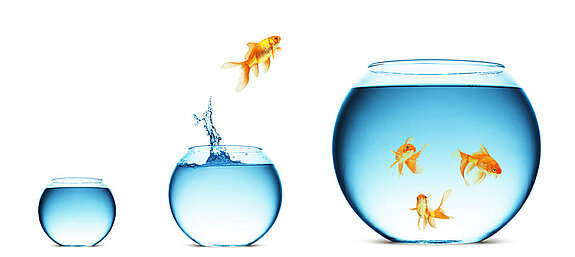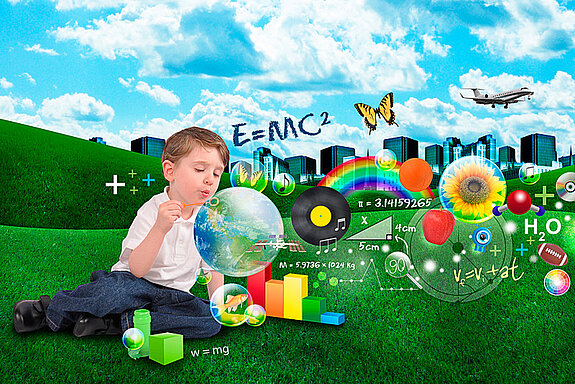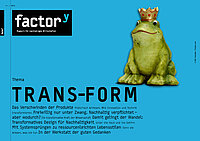Trans-form
Change through Trans-form
There are fantastic ways to play with the factory title Trans-form. It is almost as if we were playing with the convertible action figures called Transformers. They have made it into video games and films. Transformation is part of some documentaries and dystopias. Even though the need for social change is almost an integral aspect of general knowledge nowadays, we are not capable of changing our production and consumption in a way that emissions, the use of raw materials and nature loss are reduced. This is the case despite the fact that worldwide efficiency, the number of innovations and productivity are continuously increasing. There are intelligent approaches and examples for the ecological design of products, for resource-efficient products that require less material and energy, both in their production and application. And there are also transformative and transformational products whose characteristics should bring about change towards more sustainability. However, the rebound effects, i.e. the compensation of improvements in efficiency through increased consumption, are evident. How change could nevertheless be achieved is the topic of this factory issue entitled: Trans-form.
Trend researcher Peter Wippermann, technology assessor Ortwin Renn and transformation designer Harald Welzer have different approaches to the interesting possibility of letting products disappear. Bert Beyers’s retrospective piece demonstrates that technological development transforms societies and the way we consume. Philosopher Bernd Draser examines which boundary conditions we can choose from if we want social transformation towards sustainability. The President of the Wuppertal Institute, Uwe Schneidewind, demands an increased application of transformative science. Eco-designer Ursula Tischner shows that the transformative design of products and user behaviour can play a part in making change happen. In an interview, the neuro-economist Peter Kenning talks about the biological conditions for our consumption patterns. The futurologists Klaus Burmeister, Holger Glockner and Maria Schnurr investigate how we can achieve a resource-saving lifestyle through system leaps. Marc Hassenzahl, psychologist, and Matthias Laschke, designer, are convinced that transformational products can bring about a resource-friendly lifestyle. Finally, media artist Claudius Lazzeroni from the workshop of good ideas explains by what means transformative and transformational products can be developed.
The large number of contributions has already transformed this issue of factory. It is more comprehensive than we had planned. So we hope that you will also succeed in achieving change.
Ralf Bindel and the team of factory
(Translated from the German by Larissa Burkart, Mareike Baudewig, Violette Beutemann, Sina Brauch, Kerstin Haep, Yvette Gossel and Catherine Zamniack)
More articles to the topic-range of transformation, transition and change you will not only find online than in our magazine Trans-form. The PDF-magazine contains additional facts and citations, is nicely illustrated and quite good readable on tablets and screens.
Themen
- The Domino Effect: the Mobility Transition as an Engine for the ‘Great Transformation’
- Cities Use the Space
- Decarbonization by 2030
- The fear of biting the hand that feeds you
- Where investing is a pleasure
- Why divestment is going to change the world
- A Robin Hood tax for climate protection
- May the Force Be with Us
- Modern Strategies
- The prerogative of interpreting the future now lies with the companies involved in climate protection”
- From Negotiating to Trading Equitably
- Can a donkey be tragic?
- Rethink rather than rebound: a sufficiency revolution must precede the efficiency revolution
- On Rebound, Prebound and Performance Gaps
- So Let Us Seize Power Then!
- With Common Property Against Political Failure
- So Let Us Seize Power Then!
- The Comforting Beauty of Failure
- “It Is Not Impossible at All.“
- Resource-light shopping
- Men Have Not Stopped Giving the Advantage to Women – So Far
- Toothpaste for Princesses and Soup for Pirates
- It is about equality
- A nice day
- Initiative instead of frustration
- The right ingredients
- Resilient for Life
- Not only, but also
- Appreciation – more please!
- Worth more than money
- Learning to value the value of goods
- Worth and Values
- The Transformative Power of Science
- Historically effective: How innovation and technology transform
- The Disappearance of Products
- Growing Older 101
- Columbus’ Egg
- It Works! In Theory at Least ...
- What If...?
- Analysing Separately – Thinking and Acting Together!
- Let’s Break Away from Determined Breaking Points
- More Gold in Waste than in Mines
- The art of separation
- Should you really DIY?
- The Aesthetics of Do-It-Yourself
- Standing on One’s Own Feet
- From the handaxe to desktop fabrication
- Using Shares to Survive the Crisis
- When Citizens participate
- Possess to Participate
- The Right Growth at the Right Time
- Gunter Pauli and Blue Economy
- When Sustainability Grows
- How we treat Growth
- Illusions about Growth







